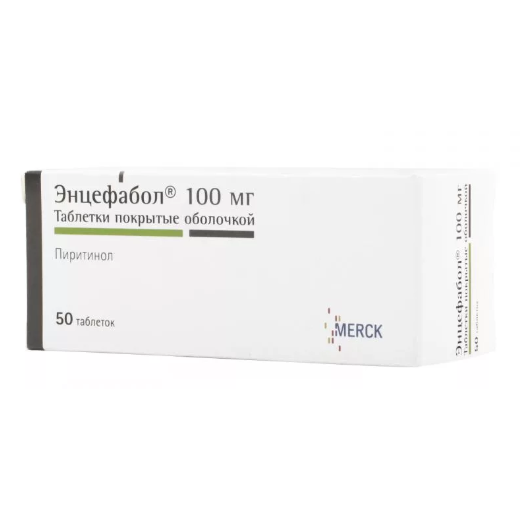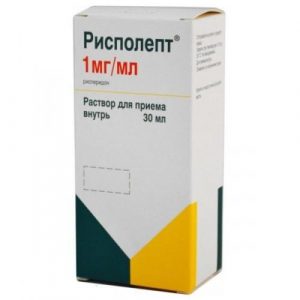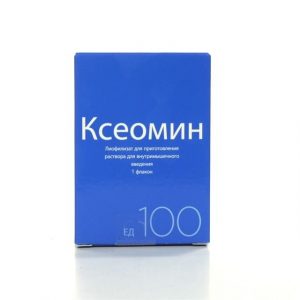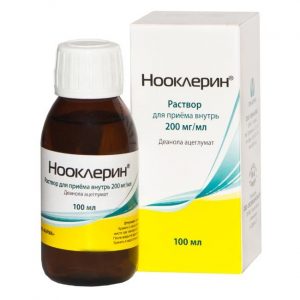Description
Release form
Tablets
Packaging
In a blister pack of 10 tablets. In the package of 5 blisters.
Pharmacological action
Encephabol is a nootropic drug. Pyritinol increases pathologically reduced metabolism in the brain by increasing the uptake and utilization of glucose, increases the metabolism of nucleic acids and the release of acetylcholine in the synapses of nerve cells, and improves cholinergic transmission between cells of the nervous tissue. Helps stabilize the structure of the cell membrane of nerve cells and their function by inhibiting lysosome enzymes, thereby preventing the formation of free radicals.
Pyritinol improves the rheological properties of blood, increases the plasticity of red blood cells by increasing the ATP content in their membrane, which leads to a decrease in blood viscosity and improved blood flow. Pyritinol, improving blood circulation in ischemic areas of the brain, increases their oxygen supply and increases glucose metabolism. As a result, memory indices improve and disturbed metabolic processes in the nervous tissue are restored, which contributes to the full functioning of its cells.
Pharmacokinetics
Pyritinol is rapidly absorbed by oral administration. Bioavailability averages 85% (76-93%). The maximum plasma concentration is reached 30-60 minutes after ingestion of 100 mg of pyritinol. The elimination half-life is about 2.5 hours.
Pyritinol metabolizes rapidly. 20-40% of the substance reversibly binds to plasma proteins. The following substances were identified as the main metabolites: 2-methyl-3-hydroxy-4-hydroxymethyl-5-methylmercaptomethylpyridine and 2-methyl-3-hydroxy-4-hydroxymethyl-5-methylsulfinylmethylpyridine. Conjugated metabolites are excreted mainly through the kidneys. The total urinary excretion within 24 hours is 72.4-74.2%. Most of the dose received is excreted during the first 4 hours after administration. With feces, only 5% of the dose is excreted.
With repeated oral administration, cumulation is not observed. Toxic concentrations do not develop even with impaired renal function.
Penetrates through the blood-brain barrier, metabolites accumulate mainly in the gray matter of the brain.
Pyritinol crosses the placental barrier. Studies have not revealed teratogenic or embryotoxic activity.
Indications
Symptomatic treatment of chronic brain disorders in dementia syndromes with the following leading symptoms: impaired memory, concentration ability and thinking, fatigue, lack of motivation and motivation, affective disorders.
Primary degenerative dementia, vascular dementia and mixed forms.
Symptomatic therapy of chronic mental disabilities.
Post-traumatic encephalopathy.
Cerebral atherosclerosis.
Effects of Encephalitis.
Delayed mental development, cerebrosthenic syndrome, encephalopathy in children.
Contraindications
Absolute: hypersensitivity to pyritinol.
Relative: a history of kidney disease, severe hepatic impairment, marked changes in peripheral blood picture, acute autoimmune diseases, such as systemic lupus erythematosus, myasthenia gravis, pemphigus.
Pregnancy and lactation
If you need to use Encephabol during pregnancy or lactation (breastfeeding), you should correlate the expected benefits to the mother and the potential risk to the fetus or baby.
Pyritinol crosses the placental barrier, in small amounts excreted in breast milk.
In experimental studies, the presence of teratogenic or embryotoxic effects of pyritinol has not been established.
Composition
1 coated tablet contains:
Active ingredient: pyritinol 100 mg.
Excipients: sodium carmellose 7000, magnesium stearate, colloidal silicon dioxide, sodium carboxy starch, lactose monohydrate, cellulose powder.
Shell composition: choline yellow dye 70%, mountain glycolic wax, gelatin, acacia gum, wheat flour, titanium dioxide, kaolin, talc (magnesium hydrosilicate), sucrose.
Dosage and administration
Dosage regimen is set individually, depending on the severity of the condition and the effectiveness of therapy.
Take the drug during or after a meal. For sleep disorders, the last daily dose should not be taken in the evening or at night. The duration of treatment depends on the clinical picture of the disease.
For adults, the average dose is 600 mg / day (2 tab. 3 times / day).
Encephabol is prescribed to newborns from 3 days after birth to 20 mg per day for a month, the drug should be given in the morning.
For children from 2 months of age, the dose is increased by 20 mg every week until the daily dose reaches 100 mg.
Children from 1 year to 7 years of age are prescribed in a daily dose of 50 mg to 300 mg, depending on the indications.
For children over 7 years old, the daily dose is from 50 mg to 600 mg (1-2 tablets, 1-3 times / day).
In acute conditions and the administration of the drug in high doses, a noticeable therapeutic effect is achieved within a few hours or days.
In chronic diseases (including the effects of traumatic brain injury or dementia), noticeable therapeutic success is achieved after 2-4 weeks of treatment. The optimal and lasting effect usually occurs after 6-12 weeks. The duration of treatment for chronic diseases should be at least 8 weeks.
In newborns with a high risk of developing perinatal pathology, the average duration of treatment is 6 months, and after 3 months you should check for indications for further treatment.
Side effects
When taking Encephabol in accordance with the indications and at the recommended doses, side effects should not be expected.
Sometimes – hypersensitivity reactions of varying severity: rashes on the skin or mucous membranes, itching, nausea, vomiting, diarrhea, fever, sleep disturbance.
Rarely – increased irritability, loss of appetite, headache, dizziness, fatigue, taste change, impaired liver function (increased levels of transaminases, cholestasis).
Drug Interaction
When used concurrently, Encefabol can potentiate the side effects of penicillamine, gold and sulfasalazine. No clinically relevant interaction of Encefabol with other drugs has been established.
Overdose
Symptoms: increased side effects.
Treatment: gastric lavage, activated charcoal appointment. If necessary, conduct symptomatic therapy.
Storage conditions
The drug should be stored at a temperature not exceeding 25 ° C.
Expiration
5 years.
Deystvuyuschee substances
Pyrytynol
dosage form
dosage form PMA
Merck KGaA, Russia




